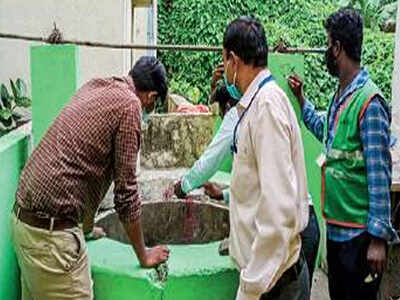
CHENNAI: Covid-19 may have reduced the number of dengue and malaria cases in Chennai this year, Greater Chennai Corporation officials said.
Till the first week of September, only 20 dengue cases have been recorded in the city while there have been around 150 malaria cases. There has been no incidence of the third major vector-borne disease, filaria, in the city so far this year.
The numbers are way lower when compared to previous years. Last year, Chennai had around 800 cases of malaria. In 2018, there were around 1,300 cases, said officials. But corporation officials are not taking it easy and are continuing with intense anti-larval activities in the city. Tiruvottiyur, Tondiarpet and Royapuram are the known malaria hotspots in the city.
There are two main reasons for the drop in the number of cases, officials said. Due to Covid-19, a majority of people have stayed indoors and have invested more time and effort in keeping their surroundings clean. This may have contributed to lower breeding of mosquitoes, an official said.
“Water is being used every day. Since there is no storage of water in large drums, breeding of the dengue mosquitoes has been less,” an official said. The dengue-causing aedes mosquitoes breed in stagnant fresh water.
Also, since most hospitals have not been operational for non-Covid patients, dengue cases may not have been registered. “The same reason may be true for labs as well as they are busy focusing on testing for Covid-19. It is only now that they would have started taking blood samples for dengue,” the official said.
Along with the regular anti-larval measures, the corporation has also planned to introduce special larvivorous gambusia fish in wells and tanks. This is a type of biological control of vector-borne diseases. These are procured from Madhavaram, an official said.
“Last year, we had used 2 lakh such fish. These stay at the surface and eat up the larvae preventing the spread of the infection,” the official said.
The regular work includes checking fresh water sources for larval breeding and fogging. Also, last year’s breeding spots have been surveyed by officials for vector density. Apart from this, door-to-door survey workers are checking backyards and terraces of houses to ensure that there is no stagnant water.
Till the first week of September, only 20 dengue cases have been recorded in the city while there have been around 150 malaria cases. There has been no incidence of the third major vector-borne disease, filaria, in the city so far this year.
The numbers are way lower when compared to previous years. Last year, Chennai had around 800 cases of malaria. In 2018, there were around 1,300 cases, said officials. But corporation officials are not taking it easy and are continuing with intense anti-larval activities in the city. Tiruvottiyur, Tondiarpet and Royapuram are the known malaria hotspots in the city.
There are two main reasons for the drop in the number of cases, officials said. Due to Covid-19, a majority of people have stayed indoors and have invested more time and effort in keeping their surroundings clean. This may have contributed to lower breeding of mosquitoes, an official said.
“Water is being used every day. Since there is no storage of water in large drums, breeding of the dengue mosquitoes has been less,” an official said. The dengue-causing aedes mosquitoes breed in stagnant fresh water.
Also, since most hospitals have not been operational for non-Covid patients, dengue cases may not have been registered. “The same reason may be true for labs as well as they are busy focusing on testing for Covid-19. It is only now that they would have started taking blood samples for dengue,” the official said.
Along with the regular anti-larval measures, the corporation has also planned to introduce special larvivorous gambusia fish in wells and tanks. This is a type of biological control of vector-borne diseases. These are procured from Madhavaram, an official said.
“Last year, we had used 2 lakh such fish. These stay at the surface and eat up the larvae preventing the spread of the infection,” the official said.
The regular work includes checking fresh water sources for larval breeding and fogging. Also, last year’s breeding spots have been surveyed by officials for vector density. Apart from this, door-to-door survey workers are checking backyards and terraces of houses to ensure that there is no stagnant water.

Coronavirus outbreak
Trending Topics
LATEST VIDEOS
City
 On cam: Navy veteran brutally beaten up by Shiv Sena goons for satirical WhatsApp forward
On cam: Navy veteran brutally beaten up by Shiv Sena goons for satirical WhatsApp forward  Delhi: International drug racket busted; Kingpin nabbed, Rs 90 crore worth heroin seized
Delhi: International drug racket busted; Kingpin nabbed, Rs 90 crore worth heroin seized  SSR death probe: Drugs were sent through courier from Sushant's house to Rhea's during lockdown
SSR death probe: Drugs were sent through courier from Sushant's house to Rhea's during lockdown  Sushant Singh Rajput is ‘beta’ of Bihar: Devendra Fadnavis
Sushant Singh Rajput is ‘beta’ of Bihar: Devendra Fadnavis
More from TOI
Navbharat Times
Featured Today in Travel
Get the app





